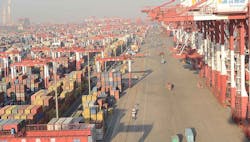China isn’t likely to have a trade war with the U.S. this year, though 2018 is harder to predict, according to former Vice Commerce Minister Wei Jianguo.
The world’s largest trading nation hopes dialog will help ease tensions and aims to make progress on agreements before President Trump visits the country, Wei told reporters in Beijing Monday. Wei is now Vice Chairman of the China Center for International Economic Exchanges in Beijing.
The two nations appear to be making progress toward announcing a series of agreements in a 100-day review designed to clear a backlog of trade and investment issues. Donald Trump, elected last year after more than two decades of criticizing China’s trade policy and a campaign full of promises to fight it, has eased off threats since meeting Chinese counterpart Xi Jinping in Florida after taking office.
Trump backtracked on his pledges to slap tariffs on Chinese goods after Xi persuaded him that he could help on North Korea. U.S. officials have warned that if China doesn’t deliver, tensions may resurface in the relationship.
Issues that make the trade relationship unpredictable beyond this year include the path of Federal Reserve rate increases, rising protectionism, Brexit and global growth, Wei said.
A former U.S. official also has expressed doubts about durability of the detente. Jake Sullivan, a former National Security Adviser to former Vice President Joe Biden, wrote in an editorial in the Australian Financial Review on June 16 that the truce was unlikely to hold. Trump, he said, was likely to realize that Xi’s China will not deliver on North Korea pledges.
China should work to reduce the risk of trade friction by continuing communication with the U.S., Wei said. Negotiations like the 100-day trade plan are necessary, but more importantly, both sides should build a rapport to solve problems, he said.
Wei said further opening-up in the financial sector and capital account are difficult for China, but that may change in two or three years.
Bilateral economic talks have had long-standing difficulties, said Zhao Jinping, senior researcher at the Development Research Center of the State Council, China’s Cabinet.
He cited China’s urging the U.S. to lift high-tech export restrictions, and complaints about foreign investment scrutiny in the name of national security. Both are of high interest to China but difficult for the two sides to agree on, Zhao said at the briefing.
By Bloomberg News
About the Author
Bloomberg
Licensed content from Bloomberg, copyright 2016.
